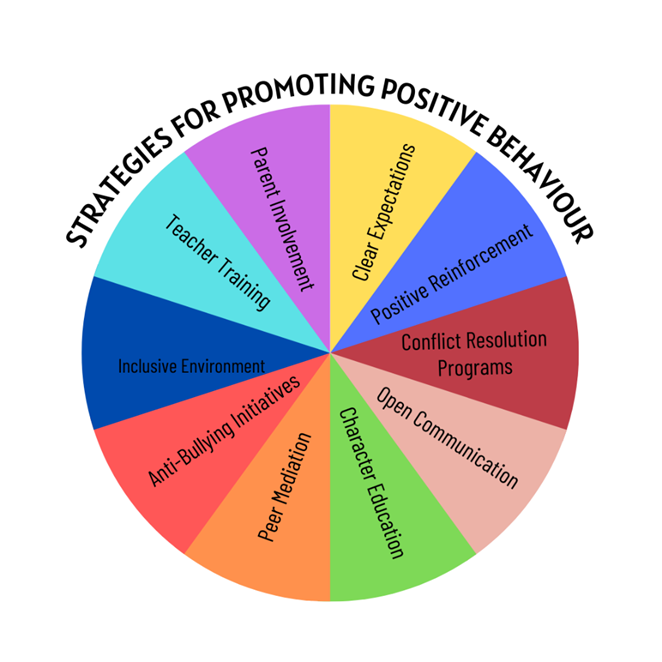Promoting Positive Behaviour: Strategies for Creating a Respectful School Community
In the realm of education, nurturing
a respectful school community is paramount. The atmosphere within a school has
a profound impact on the well-being and development of everyone involved. A
respectful and positive school community is one where every individual feels
valued, safe, and encouraged to learn and grow.
This blog explores the
significance of promoting positive behaviour in the school environment and provides
a roadmap for achieving it. We will delve into various strategies for creating
a respectful school community and discuss why these strategies are essential
for the holistic development of students.
Understanding the Importance of Promoting
Positive Behaviour
A school is more than just
a place of academic learning; it's a community where students, teachers, and
staff spend a significant part of their lives. The environment within a school
can greatly impact the well-being and development of everyone involved. A
respectful and positive school community is one where every individual feels
valued, safe, and encouraged to learn and grow. Here's why promoting positive
behaviour is crucial:
- Enhanced Learning: In a respectful and positive environment, students can focus on learning without distractions caused by disruptive behaviour. When students feel safe and respected, they are more likely to engage actively in the learning process.
- Well-Being: Positive behaviour promotes emotional well-being for both students and staff. It reduces stress, anxiety, and the likelihood of bullying or other negative behaviours. A happy and healthy school environment benefits everyone.
- Life Skills: Schools not only educate in academic subjects but also play a significant role in teaching life skills. Promoting positive behaviour helps students develop essential life skills like communication, empathy, and conflict resolution.
- Community Building: A respectful school community is like a close-knit family. It strengthens relationships among students, teachers, and staff, creating a sense of belonging and unity.
-
Strategies for Promoting Positive Behaviour
Promoting positive behaviour is key to building a respectful school community. Let’s explore the key strategies that help schools promote respect and create a positive atmosphere. From clear expectations to teacher training, these approaches enhance the educational experience for all.
- Clear Expectations:
Setting
clear expectations for behaviour is essential for creating a respectful school
community. These expectations should be outlined in a comprehensive code of
conduct that is easily accessible to all students, parents, and staff. It
should clearly define what is considered respectful and positive behaviour
within the school. This code of conduct can serve as a reference point for
everyone, ensuring that there is a common understanding of the school's values
and behavioural standards.
- Positive Reinforcement:
Positive
reinforcement is a powerful tool for promoting positive behaviour. Recognizing
and rewarding students for their respectful and kind actions encourages them to
continue exhibiting these behaviours. Rewards can take various forms, from
verbal praise and certificates to special privileges or acknowledgment in
school assemblies. Positive reinforcement not only motivates students but also
creates a culture where respect is celebrated and valued.
- Conflict Resolution Programs:
Teaching students how to effectively resolve conflicts is a fundamental life skill that can contribute to a respectful school environment. Implementing conflict resolution programs equips students with the tools to address conflicts peacefully and productively. These programs should include training in active listening, empathy, and problem-solving techniques. When students learn to resolve conflicts constructively, it minimizes disruptions and fosters an atmosphere of mutual understanding and respect.
- Open Communication:
Open
and effective communication is key to addressing behavioural issues and
maintaining a respectful school community. Establishing regular communication
channels for students, parents, and staff to express concerns, ideas, and
feedback is essential. This can include parent-teacher conferences, suggestion
boxes, or open forums. When everyone's voice is heard and valued, it enhances
transparency and strengthens the sense of community within the school.
- Character Education:
Integrating character education into the curriculum is an effective way to instil values of respect, empathy, and tolerance. These lessons can be woven into various subjects and activities. For example, literature can be used to explore empathy, history to discuss tolerance, and science to emphasize the importance of respect for the environment. Character education not only promotes positive behaviour but also equips students with a moral compass that guides their actions beyond the classroom.
- Peer Mediation:
Empowering students to take on the role of peer mediators can have a profound impact on the school community. Peer mediation programs train students to help their peers resolve conflicts. When students are actively involved in resolving issues among themselves, it not only reduces the workload on teachers and administrators but also promotes self-regulation and mutual respect. Peer mediation encourages students to take ownership of their behaviour and work towards solutions collaboratively.
- Anti-Bullying Initiatives:
Creating
a safe and respectful school community includes taking a strong stance against
bullying. Robust anti-bullying programs should educate students about the
negative effects of bullying, both on the victim and the perpetrator.
These
initiatives should make it abundantly clear that bullying will not be tolerated
and provide students with the resources and support to report and address
bullying incidents. By proactively addressing bullying, schools send a powerful
message about the importance of respect and kindness.
- Inclusive Environment:
An
inclusive school environment is one where all students, regardless of their
background, abilities, or identity, feel valued and respected. Celebrating
diversity and promoting acceptance and inclusion is a fundamental aspect of
creating a respectful school community. This can involve organizing events that
celebrate different cultures, abilities, and backgrounds. It also means
ensuring that school policies and practices are inclusive and that discrimination
is not tolerated.
- Teacher Training:
To
effectively manage behaviour and promote positive reinforcement, teachers need
to be equipped with the necessary skills and knowledge. Providing teacher
training in behaviour management and positive reinforcement techniques empowers
educators to create a respectful classroom environment. Training can cover
topics like classroom management, conflict resolution, and recognizing and
addressing behavioural issues early.
- Parent Involvement:
Parents
play a crucial role in reinforcing positive behaviour at home and supporting
the school's efforts. Schools can engage parents through workshops and events
that inform them about the school's behaviour expectations and how they can
support these expectations at home. This collaborative approach ensures that
positive behaviour is reinforced both in and out of the school environment.
Conclusion
Promoting positive
behaviour and creating a respectful school community is an ongoing process that
requires the commitment of everyone in the community. By implementing these
strategies, schools can nurture an environment where students feel safe,
respected, and motivated to excel. Remember, it's not just about managing
behaviour; it's about nurturing a culture of respect and positivity that
benefits everyone in the school community.
This transformative
approach to education not only enhances the overall learning experience but
also equips students with essential life skills, such as effective
communication, conflict resolution, and empathy, which will serve them well
beyond their school years. In creating a respectful school community, we are
not only shaping better students but also contributing to the development of
responsible and compassionate individuals who will make a positive impact on
the world.
#schoolcommunity #positivebehavior #education #respect
#communication #conflictresolution #empathy






Comments
Post a Comment